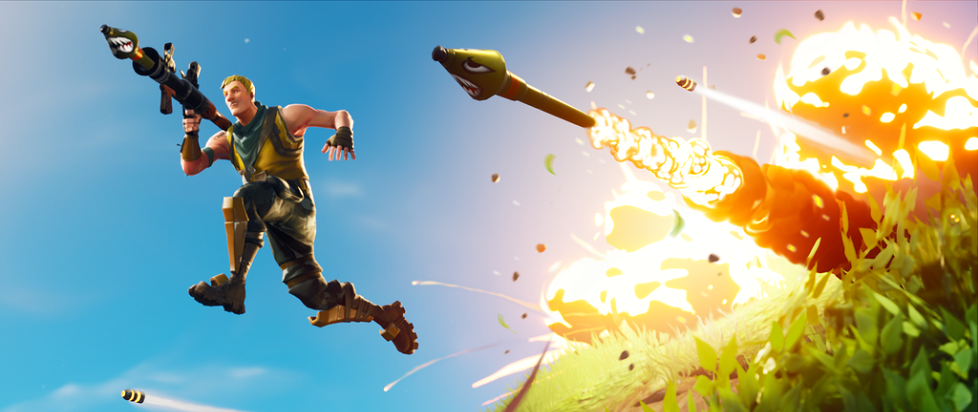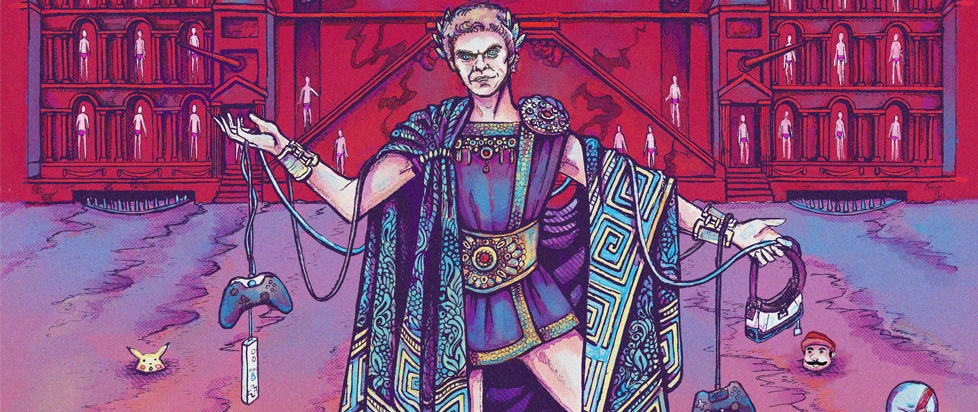
Scorched Earth
This is an excerpt of a feature from Unwinnable Monthly #110. If you like what you see, grab the magazine for less than ten dollars, or subscribe and get all future magazines for half price.

One of the most popular games in the world right now is Fortnite’s free-to-play battle royale mode. In a battle royale mode, popularized last year by Bluehole’s PlayerUnknown’s Battlegrounds, a ragtag assemblage of 100 players parachute bare-handed from a dirigible onto a remote island and are inevitably forced together by an electrical circle’s slowly shrinking circumference. As is custom with battle royale modes, you scramble to pick up any weaponry, ammunition, and health and shield potions along the way. Fortnite’s added wrinkle is derived from its original zombie survival mode, wherein the player must siphon away natural resources like metal, wood and stone to quickly construct ramshackle defensive fortifications, staircases and bridges, which adds a layer of strategy to the game on top of the traditional third-person shooter macrostructure.
In December of 2017, Epic added a 50v50 mode in a limited run capacity. It’s as the name implies: the game divides the player base in two and blithely mashes the teams against each other in an all-out war. Playing this mode was the first time Fortnite really made sense to me; the game’s key differentiating hook, building structures, becomes an act of massive collaboration. Gone are the solipsistic prepper stashes of solo and duo modes which promote individualist survivalist tendencies. Instead, you and other players are establishing foundations and appending panels, windows, roofs and such to each other’s work. It’s a bit like Minecraft with fewer resources to pull from, but more touch-and-go than that, as inevitably your collaborative creations will be erased come the conclusion of a match. 50v50 mode then can feel a bit like performance art or improvisational city-planning. Outcomes of a match here are far more luck-based than they are about coordination, as it’s impossible to communicate with everyone in a platoon that large.

Often, this means that victory is synonymous with a complete shutout of the opposing team; rarely is a match won by the skin of your teeth. This is a somewhat common occurrence in elimination-style modes in competitive multiplayer games like these; wars are ‘won’ by having more resources (people, rations, ammunition, land, settlements, etc.) than the opponent. But with other games, it’s easier to feel okay about participation in something so ideologically fraught on paper. If a squadron of soldiers tried fighting off the opposition in the way a group of 13 year-old boys plays Battlefield 1, they would be wiped out in an instant. There’s distance in difference here.
Not so with 50v50 Fortnite. Shutouts here are frightening displays of utterly fascistic behavior because of the crafted fortifications added into the mix. When the player count differential between opposing teams is over twenty, it’s natural for the few surviving players on the losing side to try and hide away from their competition. They cower in nervous fear, scanning the battlefield for just the right arsenal, the right angle, the right time to stage an escape and get the jump on their oppressors. Yet it’s pointless; the winning team aims their rockets, grenades, mines and assault rifles at anything and everything they can and let their artillery do the talking. You will be found; it’s only a matter of time. Whether it’s from a stray bullet or the sapping away of health points from getting caught outside the circle, the team with fewer personnel always loses. The winners dump their remaining ammunition toward the sky, having successfully flooded the field of battle with self-righteous glee. In all their hubris, they build shelters atop the flotsam and jetsam out of what’s left of their accrued resources, all because they can. This is competitive multiplayer as imperialism, as colonialist iconoclasm and reappropriation. It’s a release from the trudging monotony endemic to the early stages of any battle royale match, where everyone is just looking for something to happen.
———
Devin Raposo is a writer living in Cape Coral, FL. Find him on Twitter @dtraposo.
You’ve been reading an excerpt from Unwinnable Monthly Issue .
To read the article in its entirety, please purchase the issue from the shop or sign up for a subscription to Unwinnable Monthly!




